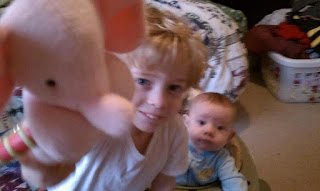This week I'm pleased to share Scott Owens as the next contributor to the Life Changing Moments Series of blog posts. I first "met" Scott online, but last year, Tammy and I were able to talk with him in person at the Blue Ridge Writers Conference (in Blue Ridge, GA). Later this year, we'll be reading our poetry at one of his Poetry Hickory events (in Hickory, NC). Scott is the author of several poetry collections of poetry, including For One Who Knows How to Own Land
(Future Cycle Press, March 2012) and Shadows Trail Them Home
(a collaboration with Pris Campbell due October 2012 from Clemson University Press). He is also the editor of Wild Goose Poetry Review and 234. An eight-time Pushcart Nominee, Scott also serves as Vice President, Poetry Council of North Carolina; works as an instructor, Catawba Valley Community College; is founder and facilitator, Poetry Hickory; acts as regional rep, NC Writers' Network. In other words, he keeps himself busy. http://www.scottowenspoet.com/
 |
| Super busy poet and poetry advocate, Scott Owens. |
So, Robert wrote to me with a simple request: write a 500-1,000 word personal story about a moment that helped guide my life or shape my worldview. Easy, right? No need to complicate things, just tell about the time I learned the meaning of love while holding my sick 4-month old daughter at 2:00 A.M.; or the moment my stepson burned himself and in caring for him I realized that I had overcome my own childhood abuse and was ready to fully embrace fatherhood; or the night I listened to my grandfather string stars together into his own constellations and recognized the power of creativity and self-determination; or the time when I was 8 and had to reach up inside a birthing cow and turn the calf so it could come out and realized none of us can do it alone. Easy, right?
The problem is, all of the moments I could think of I have already written about in the form of poems, and telling those stories now as prose would seem somehow sacrosanct, a reductionist undoing. The poems, I hope, embody the tensions of those moments, recreate the epiphanies as if they were the readers as well as mine, retain the life of the moment in a combination of language, imagery, and association that might well be lost in the single-minded clarity of prose. At least that's how the poetry-lover in me thinks. As a teacher of poetry, I would never ask a student to retell the story of Galway Kinnell's "Little Sleep's Head Sprouting Hair in the Moonlight" in prose. I would, of course, invite them to write about the poem in prose, but not to try to prosaically recreate the moment of the poem by undoing, even negating the energy contained and conveyed through the poetic compression of the moment's perceptual, physical, cognitive, emotional, and spiritual experience.
Nevertheless, I greatly appreciate the impetus behind Robert's request. In fact, I've been teaching workshops around the South for a couple of years now on techniques to access and organize such moments in our experience as potential subject matter for both poetry and prose. So, the last thing I would want to say to Robert on this request is "never mind." Instead, I'll do as poets tend to do anyway and complicate his request by giving him a couple of moments that match his criteria except that they're written not as prose but poetry. I hope they'll still work for his purposes and that they'll prove enjoyable and fruitful for his readers.
Promises at 2 A.M.
After four months of holding you,
my body sways constantly,
rocks a little when I walk.
My left arm keeps the shape
of a cradle. My mouth hums
lullabies night and day.
Little Sawyer, still more hope
than substance, I will be everything
a father ought to be. I will teach you
all that I know, all I can learn.
I will give you every chance
I can afford and more.
I will hold you when you hurt,
sing to you when the noise of the world
and your body's frailty leave you unsure.
And I will never let them take you, ever.
I would flame at the stake for you,
bare my neck beneath the blade,
suck the strongest poisons straight
from your body’s wounds, wander the wilderness
in quest for all you need, bend
my knee to any heaven's oppression.
I will give all and more
to save my life by saving yours.
Foundings
The first time my stepson cried
without his mother’s hands
to brush the pain away
I came to him quickly
without thinking. I touched him
with almost a space between
my flesh and his, the way
a woman, aging and overweight,
steps off a curb as if the path
beneath her might not be real.
And then, he leaned into me,
and my whole body changed
into something I had not known
existed, and what was once
no part of me began
to keep the ticking
of our two wrists as one.
Looking for Faces in the Night Sky
These are things anyone could have made
up. The stars are nothing but stars,
and playing dot-to-dot in the night
sky makes anything possible.
Years ago from the stone porch
my grandfather pointed them out:
the lion, the great bear, the hunter's sword.
This one he called Mary and showed me
how the stars made a woman’s face.
Looking for faces in the night sky
we string stars into shapes of things
we fear or long to remember.
I see spider, sparrowhawk, bobwhite.
This one I'll call woman becoming
an angel, the grotesque buds of wings
sprouting in her back.
Acts of Defiance
Just a boy,
not yet eight,
and knowing nothing
of the world,
I simply did as I was told
and reached my hands,
my forearms, long and thin,
even up to the elbows,
into the bloody back end
of a moaning cow
to grasp what I felt there
and pull,
and pull harder
when it wouldn't come
until something appeared,
and pull harder still
until something became
a wet mess of calf
spilling into my lap
and my uncles laughing
and my grandfather,
his hand on my shoulder,
looking at me hard,
eyes full of seriousness
saying,
Good job.
Good job.
A lifetime later,
at forty-one,
holding you
I finally understand
the weight of it all.
I look at your mother
spent in bed
and say,
Good job,
and then into your own
uncomprehending eyes
and say again,
Good job.
*****
If you think you have a great life changing moment to share (and you probably have several),
click here to learn how to get the conversation started. I'm sure if you think it's important, I may too.
*****
Connect with me on
Twitter,
Facebook, and
LinkedIn. Plus, sign up for free e-mail updates from this blog in the top right-hand corner of the page.
*****
Check out previous posts from the Life Changing Moments Series:













